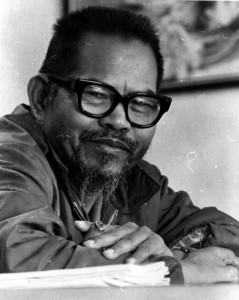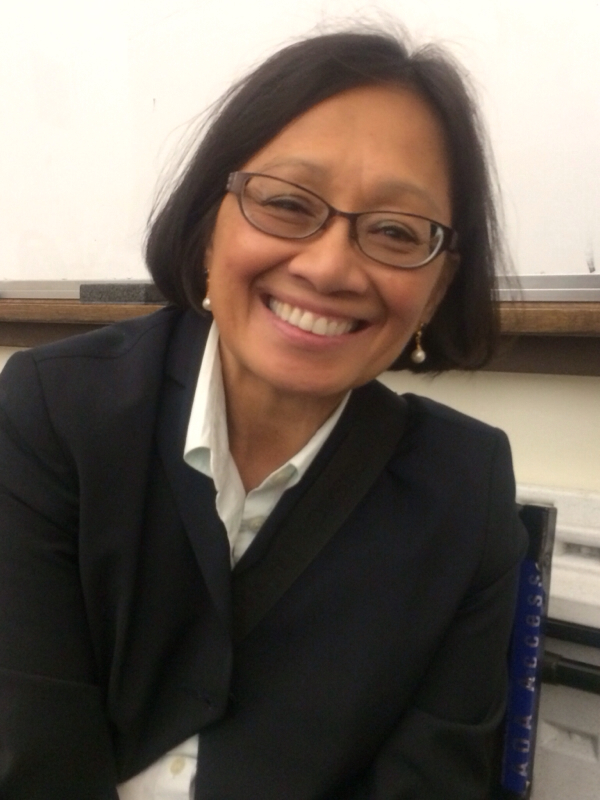At the Fred T. Korematsu Day ceremonies in San Francisco’s Herbst Theatre (Korematsu is the man who said no to the U.S. internment of Japanese Americans during WWII), I saw two American Filipino heroes most people should know but usually don’t: Labor organizers Larry Itliong and Philip Vera Cruz.
Itliong and Vera Cruz were the heart and soul of the farm worker movement when Filipinos dominated California’s Central Valley fields. But they were overshadowed in the 60s by Cesar Chavez, who took advantage of the massive wave of Mexican immigrant labor, and became the face of the farmworker movement.
Were Filipinos in the fields? Aren’t the workers all Mexican?
Itliong and VeraCruz have long been ignored and left out of the histories. Chavez gets streets and schools named for him.
A generation later and Latinos seem poised to trump Filipinos again as our politicians consider comprehensive immigration reform.
One would think it shouldn’t be so hard to find common ground between Filipinos and Latinos. Thanks (or “no thanks”) to imperialism, the broad group of American Filipinos, both born here and immigrants, legal and illegal, usually have Hispanic last names, as well as the Catholic Church in our DNA.
For these purposes, I like to call us “Aspanics,” Asian Hispanics by way of those wayward explorers.
But we definitely screw up the political puzzle in the U.S. especially in this new immigration debate where those of Mexican descent dominate the discussion.
And while there are a lot of them in the 11 million estimated undocumented immigrants here in the U.S., there are a lot of Asian Americans too. It’s estimated there’s an undocumented community of around 270,000 Filipinos, and another 200,000 Asian Indian. All told, there’s maybe a million Asians who are undocumented.
One million and we’ll likely not even be seen as significant in the debate.
Instead, we’ll all be lumped together, as if you can apply a single standard to immigration reform.
You want to talk about immigration? Why is anyone linking any reform to beefing up the Border Patrol and border security with more money and resources?
Does that even make sense if you’re talking about Asian immigration? Latino advocates say it doesn’t even make sense for them.
I know some Asian immigrants do come in through Mexico, but this is the problem about immigrant “lumping” that I see is a big problem in the ongoing debate.
I’d say for Filipinos and other Asians, the biggest problems are overstays and tourism. There’s something about the bureaucracy where people lose track, documents are forged.
How is Border Security relevant to our group?
Another idea President Obama mentioned is a requirement to “learn English.” Shouldn’t apply to Filipinos or Indians who know English and spawn call centers. But the whole idea of requiring English seems counter to our democracy. Why are we bringing back the legacy of literacy laws?
Indeed, there’s a lot of ideas being kicked around. The only thing that seems to unify everyone is that magic phrase:“pathway to citizenship.”
But this is hardly a red-carpet or yellow-brick road. What if the pathway takes decades?
And where would one wait?
If you have to go back to your ancestral home, where is the line? Hey, there really is no line. You just have to put your life on hold. For decades, maybe.
Where’s the fairness there?
And what if you go home and die waiting? Sounds like the virtue of “self-deportation.”
OK, in an attempt at compromise, what if you get to stay here in the U.S.?
Then congratulations, you’ve voluntarily turned yourself in and have become an official “documented undocumented person.”
You had jobs and paid taxes before (not all are paid under the table and skip taxes). Some banks even made mortgages to undocumenteds.
Now will you be allowed to collect on the public benefits you contributed to?
Or will you now have the official brand that allows for people to legally discriminate against you?
At least the bureaucracy that failed to keep tabs on your student or tourist visa, now has you in their sights.
One thing people seem to agree on is the Dream Act. Maybe all the talk of comprehensive reform will allow for that to finally happen. In his Las Vegas speech, Obama definite seemed to signal that would be coming as he told the story of a young man who was among the first to be approved in the deferred action amnesty program.
But what about the mature immigrant? Why discriminate against the older immigrant who works here, pays taxes but doesn’t have papers?
He has to start over in mid-life back in the Philippines?
There’s lots of problems in beginning this debate that the president says we could be ready for. Let’s hope so. But let’s also hope that Aspanics and other Asians don’t get lost in whatever compromise plan, if any, gets adopted.
But I have to admit, just thinking about what happened to Filipinos when Chavez took over the fields, gives me pause.
Let’s hope fairness doesn’t get lost in the compromise.
 Marissa Aroy’s “Delano Manongs” gets a sold-out screening at CAAMFest2014 in San Francsico Sunday night. Just saw a preview of the documentary and it fills in the blanks in the Filipino-less, UFW/Cesar Chavez story.
Marissa Aroy’s “Delano Manongs” gets a sold-out screening at CAAMFest2014 in San Francsico Sunday night. Just saw a preview of the documentary and it fills in the blanks in the Filipino-less, UFW/Cesar Chavez story.

